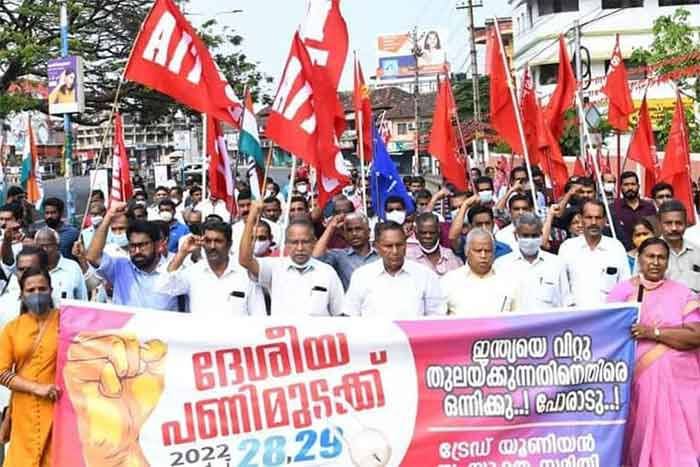
The call for a 2 day national level strike by workers given by 10 central trade unions and other supporting organizations in India drew a strong response by over 200 million ( 20 crore) workers on March 28 and 29, according to organizers. These workers included those from ports and mines, railways and transport, banking and insurance, refineries and telecom, public as well as private sector (including multinational companies). There was a significant presence of women in the strike, particularly those employed in various development schemes, often at very low wages.
The strike was in addition supported by the Samyukta Kisan Morcha, an umbrella organization of 40 farmers’ organizations which had spearheaded a massive and successful farmers’ protest movement last year.
This strike call was given at a time of increasing reports of the twin burdens of unemployment and inflation. Rates of urban unemployment have been at high levels, while the price of essential goods has been increasing. In the process most worker households have faced increasing difficulties in making basic needs. Reports of workers being made to work for longer hours in more difficult conditions have appeared increasingly, resulting in several industrial and construction site accidents.
The demands voiced by these workers include the protection of labor rights won by years of struggle as several of these rights are likely to get diluted or pushed back in the course of the government’s insistence on ‘consolidating’ them in 4 labor codes. For example there has been increasing uncertainty that important gains achieved by construction workers from two laws made specifically for them may be diluted even though efforts made in recent years for their better implementation have resulted in favorable decisions even from the Supreme Court. Just when they were thinking that the proper implementation of the directives of the Supreme Court of India will provide them significant, overdue gains resulting from the two existing laws, construction workers are faced with the uncertainty of the new labor codes. As several labor activists point out, the uncertainties at the ground level are much more compared to what the government cares to admit.
There are increasing apprehensions of workers losing jobs and rights in the course of policies of relentlessly increasing privatization under different names and schemes. Instead of striving to rapidly increasing social security cover to unorganized sector workers who are largely deprived of this, the policies of the government are widely seen to be creating more uncertain and difficult conditions for workers. Millions of unorganized works including women in recent years have been devastated in recent years by the combined impact of prolonged lockdowns as well as arbitrary, adverse government policy decisions like the one on demonetization which suddenly put out of circulation 86% of the currency at one blow.
This strike call was also accompanied by demands for increasing allocation for rural employment guarantee scheme (MGNREGA). This is seen as a very helpful scheme, started by the previous UPA government, which has attracted much attention outside India as well. However those monitoring the scheme have pointed out repeatedly that its budget needs to be increased significantly beyond the present allocation to cope with compelling needs of recent times. An urban employment guarantee scheme has also been demanded in recent years and in fact has already been initiated by some state governments in smaller ways, more particularly by the Rajasthan government very recently. However a bigger initiative by the central government regarding this is still awaited.
Much higher allocations for social sector including health, nutrition and education are widely regarded as long overdue, with a strong prioritization for meeting the needs of weaker sections. This should include significant increase in the allocations for important schemes which should also include provision for increasing the wages of workers employed in these schemes, most of whom are women and have toiled for long hours daily at less than the legal minimum wage rate. In remote villages I have met cooks, often elderly women, who have been preparing meals for around 100 or more school children while getting around Rs. 40 a day on average ( about half a dollar), and even this payment often gets delayed.
All these demands have been raised in the course of this strike call. These demands include old demands like those relating to regularization of contract workers but also involve relatively new ones like those relating to the much better protection and remuneration of those health and sanitation workers who have been in the forefront of the COVID 19 efforts.
There are also much debated issues relating to the restoration of the old pension scheme. Reforms which can protect worker and employee interests while also accommodating fiscal concerns have also been proposed. In such contexts perhaps a middle path can be explored with broad-based consultations.
However most of the demands of the workers voiced at the time of this recent strike call are well-justified and it is heartening to see that workers are agitating not just for protecting their own interests but also for protecting the wider interests of people in such crucial areas as banking, insurance and health. There should be adequate follow-up efforts after the strike to reach out to more people so that with greater public education on these significant issues, a broader base of support around these important demands can be created.
Bharat Dogra is Honorary Convener, Campaign to Save Earth Now. His recent books include Man Over Machine and Planet in Peril.







































